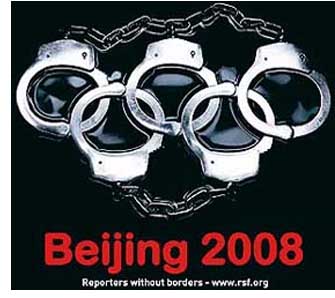Bringing LIBERTY to Capitol Hill -- 2008
|
August 9, 1945
|
|||||||||||||||||||||||||||||||||||||||||||||||||||||||||||||
President Bush's
|
Another Perspective:
|
| THE PRESIDENT: Good morning. I'm speaking to you from Beijing, where I've come to support American athletes participating in the Olympic Games. This is a moment of pride for our Olympians and the great Nation they represent, and Laura and I are honored to share it with them. | The Bushes are not sharing this moment of pride as tourists, but as official representatives of the U.S. federal government. |
| In addition to attending the Olympics, my schedule includes meeting with China's President, dedicating a new U.S. embassy in Beijing, and worshiping at a local church. During my time here, I'm expressing America's deep concerns about freedom and human rights in China. This trip has reaffirmed my belief that men and women who aspire to speak their conscience and worship their God are no threat to the future of China. They are the people who will make China a great nation in the 21st century. | The condition of liberty under Chinese Communism is horrifying. If the extremist rhetoric of the Declaration of Independence was justified against the relatively-libertarian government of George III, more rhetoric than this is justified against Communist China.
But criticisms of China, coming from the U.S. federal government, would sound fairly hypocritical. |
| One of the most striking parts of this trip is seeing how much China has changed. I first visited the country more than three decades ago, when my dad was America's representative in Beijing. Poverty was rampant, and the streets swarmed with bicycles. Today, China is sprinting into the modern era. Beijing is covered in skyscrapers and filled with cars. And the people of China have more connections to the world than ever before. | Is change (modernization, increase in living standards) in China the result of the Chinese Communists, or Chinese entrepreneurs?
China: From Death Camp to Civilization
|
| These changes present the Chinese people, the American people, and the world with tremendous opportunities. So over the past eight years, America has sought to put our relationship with China on a more solid and principled footing. We've advanced both our nations' interests by expanding free and fair trade and encouraging the rise of a Chinese middle class -- which can be an enormous market for American exports. We have also cooperated on other shared challenges, from fighting pandemic disease to opposing North Korea's nuclear weapons programs. | |
| At the same time, America has spoken candidly and consistently about our concerns over the Chinese government's behavior. We have made it clear that trusting their people with greater freedom is necessary for China to reach its full potential. We've emphasized that being a global economic leader carries with it the duty to act responsibly on matters from energy to the environment to development in Africa. | Bush is not America. How can a government that regulates every aspect of trade and commerce; censors books, movies and art; seizes business records and bank accounts; confiscates guns; taps telephones and reads mail and electronic messages; dictates wages and working conditions; seizes assets for the benefit of the government, promotes abortion, imposes fines and imprisonment with little regard for due process or justice, segregates anti-government protesters away from the object of their protests into "free-speech zones, violates the privacy of medical records, and takes over half of everything its citizens earn, have anything "candid and consistent" to say to China? |
| Only China can decide what course it will follow, but I'm optimistic about the prospects. Young people who grow up with freedom in one area of their lives will ultimately demand freedom in other areas. The China of the future will reflect its own culture and traditions, but it will also reflect the universal aspirations of mankind -- and there's no deeper human desire than liberty. | |
| America's relationship with China is one element of our broader strategy for the region. When I took office, I brought a clear conviction that America is a Pacific Nation, and our engagement with Asia should be stronger than ever before. We've acted on that conviction by pursuing four broad objectives: We bolstered all five of our treaty alliances in the Asia Pacific region -- Japan, Australia, the Philippines, and two countries I visited this week, South Korea and Thailand. | |
| We have strengthened our relationships with other free societies in Asia -- including India, the world's largest democracy, and Indonesia, a democratic nation that is home to more Muslims than any other nation on Earth. We have seized opportunities for prosperity by negotiating new free trade agreements, including an historic agreement with South Korea -- an agreement which our United States Congress must pass. And we helped bring together nations throughout the Asia Pacific to fight terrorism, seek an end to tyranny in Burma, respond to natural disasters, and address other challenges to our people and our prosperity. |
The great rule of conduct for us, in regard to foreign nations is in extending our commercial relations to have with them as little political connection as possible." I deem [one of] the essential principles of our government, and consequently [one] which ought to shape its administration,…peace, commerce, and honest friendship with all nations, entangling alliances with none. |
| My trips to Asia as President have brought many uplifting moments. One of the most moving came this week in Seoul, when I spoke to American troops at the Yongsan Garrison. These men and women are carrying the burdens of military life far from home. Yet in their faces you can see a quiet pride that comes from having an important job, and doing it right. These brave Americans are preserving peace, and they're sending a broader message about our approach toward Asia. Now, and always, the United States will keep our word to our friends. We will stand confidently for liberty. And we will advance our Nation's interests and ideals by staying engaged in this pivotal part of the world. | |
| Thank you for listening. |
Kevin Craig's Platform:
Additional Libertarian Resources
The Chinese Government
|
The Chinese People
|
Revolution Won't Come in a Day
John Adams once wrote that the American Revolution began in 1761, when Massachusetts attorney James Otis began legal challenges to the Writs of Assistance. He lost the case, but "American independence," Adams wrote, "was then and there born." Now do the math. That means it took 15 years to convince the rest of America to declare Independence (1776). Then another seven years of war was required before a Peace Treaty was signed (1783), and then six years before the Constitution was finally ratified (1789). That's almost 30 years. (And Jefferson said we shouldn't go 20 years without another rebellion!) How can we hope to convince Americans to fight for principles they were never taught in government schools? We need to be in this battle for the long term. "Eternal Vigilance is the Price of Liberty."
The Internet Can Speed up the Revolution
Here are ways you can help.
Communicating with Government and Media
- Contact Congress -- this is from the JBS website, powered by "CapWiz," from Capitol Advantage. Lots of organizations use capwiz. If you don't want to go through the JBS, search for capwiz on Google and find another organization that uses it.
Notice that you can also contact media through this webpage.- Action E-List
Sign up for the JBS Action E-List and be notified when you can make a critical difference on important issues.
Support an Iraq Referendum
Americans keep debating when, how, or if to leave Iraq. Maybe we should ask the Iraqi people what they want. After all, it's their country. Tell Congress to request that the Iraqi government hold a public referendum on the U.S. occupation. Learn more »
Make Congress read every word of every bill they create before they vote on it.
Urge your Representative and your Senators to sponsor DownsizeDC.org's “Read the Bills Act” (RTBA).Unelected bureaucrats create tens-of-thousands of new dictates each year. Making rules is the job of Congress, not bureaucrats.
DownsizeDC.org has drafted the “Write the Laws Act” to end bureaucratic “legislation without representation.” Click here . . .
"Cap and Trade" is not the way
The politicians seem to be unifying around "cap and trade" as a way to cut CO2 emissions. If they take this step it may be the largest increase in the size, scope, and intrusiveness of government since the creation of Medicare. Worse still, it may not even achieve its purpose. Please tell Congress to oppose "cap and trade." Learn more »
Iraq Waste
Big government prospers through failure. Each new failure is used to justify more spending and new powers. Wasteful spending in Iraq is the latest example. One way to change this is to hold government accountable. A new bill in Congress seeks to provide some of the needed accountability. Please support it. Learn more »
Support Ron Paul's “American Freedom Agenda Act”
The politicians have done great harm to this country in response to the 9-11 attack. A bill has been introduced that will undo much of that harm.
Learn More »
Stop the War for Terror
U.S. policy has inflamed the Middle East. It has made terrorism more likely rather than less. We seem to be fighting a war for terror, rather than on terror. This policy must stop. The place to start stopping is with Iran. We must not attack Iran. War with Iran would devastate our economy, disrupt world oil supplies, and recruit more terrorists. Click here to stop this war before it starts.
The Democrat Party Radio Address:
The The Democratic Radio Address was delivered by Democratic Presidential Candidate Barack Obama, who said America is worse off than eight years ago, in part because of the money spent in Iraq, and tax cuts for the wealthy. Obama proposed government "investments" in green technology.
If Obama becomes President for the next eight years, at the end of his second term there will still be U.S. military forces in Iraq. The U.S. military bases being built in Iraq are not just bases, they are cities. U.S. foreign policy is not one of "no entangling alliances," it is one of hegemony. These are two fundamentally different approaches, and Obama has never said anything that would indicate a fundamental change of policy, from the Bush-Clinton policy of hegemony, back to the Jeffersonian principle of "no entangling alliances."
There will be no significant changes in U.S. foreign policy in the Obama Administration.
Click here for a replay of this edition of the Ozarks Virtual Town Hall



